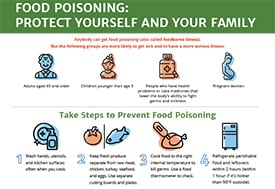Key Facts About Food Poisoning
Every year, an estimated 1 in 6 Americans (or 48 million people) get sick, 128,000 are hospitalized, and 3,000 die of foodborne diseases.
Tips to Prevent Food Poisoning
- Clean
- Wash your hands and work surfaces before, during, and after preparing food. Germs can survive in many places around your kitchen, including your hands, utensils, cutting boards, and countertops.
- Separate
- Separate raw meat, poultry, seafood, and eggs from ready-to-eat foods. Use separate cutting boards and keep raw meat away from other foods in your shopping cart and refrigerator.
- Cook
- Cook food to the right internal temperature to kill harmful bacteria. Use a food thermometer.
- Chill
- Keep your refrigerator 40°F or below. Refrigerate leftovers within 2 hours of cooking (or within 1 hour if food is exposed to a temperature above 90°F, like in a hot car).
Some People Are at Higher Risk
Anyone can get food poisoning, but some groups of people are more likely to get sick and to have a more serious illness. Their ability to fight germs and sickness is not as effective for various reasons. These groups include:
- Adults age 65 and older
- Children younger than age 5
- People whose immune systems are weakened by health conditions or medicine used to treat them, including people with diabetes, liver or kidney disease, HIV/AIDS, or cancer
- Pregnant women
Learn more about why these groups are more likely to get sick from germs like Salmonella, Campylobacter, Listeria, or E. coli.
People who are more likely to get food poisoning should not eat the following:
- Undercooked or raw food from animals (such as beef, pork, chicken, turkey, eggs, or seafood)
- Raw or lightly cooked sprouts
- Unpasteurized (raw) milk and juices
- Soft cheese (such as queso fresco), unless it is labeled as made with pasteurized milk
Five Symptoms of Severe Food Poisoning
Symptoms of food poisoning often include diarrhea, vomiting, upset stomach, or nausea. See your doctor if you have severe symptoms such as:
- High fever (temperature over 102°F, measured orally)
- Bloody stools (poop)
- Frequent vomiting that prevents keeping liquids down, which can lead to dehydration
- Diarrhea that lasts more than three days
- Dehydration, which causes symptoms such as dry mouth and throat, feeling dizzy when standing up, and little or no urination
More Information



































No hay comentarios:
Publicar un comentario